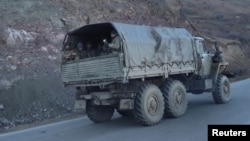Dozens of Armenian soldiers have been captured or gone missing following the latest clashes on the border with Azerbaijan, officials in Yerevan said on November 17.
Meanwhile, Azerbaijan’s Defense Ministry said on the morning of November 17 that seven of its soldiers were killed and 10 others wounded in renewed fighting on the shared border that erupted on November 16.
According to a statement by Armenia’s Defense Ministry, 13 Armenian soldiers were captured by Azerbaijani forces and another 24 Armenian servicemen have gone missing and that their fate remains unknown.
The statement added that one Armenian soldier was killed in the fighting, which Yerevan says has stopped following talks with Moscow.
Both sides blamed each other for starting the latest conflict amid tensions between the two former Soviet nations that have simmered since a six-week war last year over Nagorno-Karabakh.
Azerbaijan said its forces prevented "large-scale provocations" by Armenian forces in the Kalbacar and Lachin districts bordering Armenia.
In turn, Armenia's Defense Ministry accused Azerbaijani soldiers of shooting at its positions along the border, using artillery, armored vehicles, and guns.
Later on November 16, Russia’s Defense Ministry reported that hostilities on the Armenian-Azerbaijani border had ceased after a cease-fire was reached with Moscow’s mediation. Armenia confirmed that report.
The situation along the border has been tense since the two South Caucasus nations fought a 44-day war over Nagorno-Karabakh last year that killed at least 6,500 people and ended with a cease-fire that granted Azerbaijan control of parts of the region as well as adjacent territories occupied by Armenians.
The breakaway region is internationally recognized as part of Azerbaijan but had been under the control of ethnic Armenian forces backed by Armenia since the end of a separatist war in 1994.
U.S. Secretary of State Antony Blinken said that Washington was “troubled” by the reports of the fighting. In a tweet on November 17, Blinken called on both sides to engage “directly and constructively to resolve all outstanding issues, including border demarcation.”
On November 16, the European Union also urged the two sides to show restraint.
Calling for “urgent de-escalation and [a] full cease-fire,” the president of the European Council, Charles Michel, described the situation in the region as “challenging.”
“The EU is committed to work with partners to overcome tensions for a prosperous and stable South Caucasus,” Michel wrote on Twitter.
Some information for this story came from the Associated Press.




